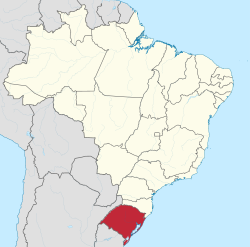Rio Grande do Sul | |
|---|---|
|
| |
| Motto(s): | |
| Anthem: Hino Rio-Grandense | |
 Map of Brazil with Rio Grande do Sul highlighted | |
| Coordinates: 30°S 53°W / 30°S 53°W | |
| Country | |
| Capital and largest city | |
| Government | |
| • Governor | Eduardo Leite (PSDB) |
| • Vice Governor | Gabriel Souza (MDB) |
| • Senators | Hamilton Mourão (REP) Luis Carlos Heinze (PP) Paulo Paim (PT) |
| Area | |
• Total | 281,707.149 km2 (108,767.738 sq mi) |
| • Rank | 9th |
| Population (2022)[1] | |
• Total | 10,882,965 |
| • Rank | 6th |
| • Density | 39/km2 (100/sq mi) |
| • Rank | 13th |
| Demonym(s) | gaúcho, rio-grandense or sul-rio-grandense |
| GDP | |
| • Year | 2015 |
| • Total | US$205 billion (PPP) US$115 billion (nominal) (4th) |
| • Per capita | US$18,131 (PPP) US$10,244 (nominal) (5th) |
| HDI | |
| • Year | 2021 |
| • Category | 0.771[2] – high (5th) |
| Time zone | UTC-3 (BRT) |
| Postal code | 90000-000 to 99990-000 |
| ISO 3166 code | BR-RS |
| License Plate Letter Sequence | IAQ to JDO |
| Website | rs.gov.br |
Rio Grande do Sul (UK: /ˌriːuː ˌɡrændi duː ˈsʊl/,[3] US: /- ˌɡrɑːndi duː ˈsuːl/,[4] Portuguese: [ˈʁi.u ˈɡɾɐ̃dʒ(i) du ˈsuw] ; lit. "Great River of the South") is a state in the southern region of Brazil. It is the fifth-most populous state and the ninth-largest by area. Located in the southernmost part of the country, Rio Grande do Sul is bordered clockwise by Santa Catarina to the north and northeast, the Atlantic Ocean to the east, the Uruguayan departments of Rocha, Treinta y Tres, Cerro Largo, Rivera, and Artigas to the south and southwest, and the Argentine provinces of Corrientes and Misiones to the west and northwest. The capital and largest city is Porto Alegre. The state has the highest life expectancy in Brazil, and the crime rate is relatively low compared to the Brazilian national average.[5] The state has 5.4% of the Brazilian population and it is responsible for 6.6% of the Brazilian GDP.
The state shares a gaucho culture with its neighbors Argentina and Uruguay. Before the arrival of Portuguese and Spanish settlers, it was inhabited mostly by the Guarani and Kaingang peoples (with smaller populations of Charrúa and Minuane). The first Europeans there were Jesuits, followed by settlers from the Azores. In the 19th century it was the scene of conflicts including the Ragamuffin War and the Paraguayan War. Large waves of German and Italian migration have shaped the state as well.
- ^ "2022 Census Overview" (in Portuguese).
- ^ "Atlas do Desenvolvimento Humano no Brasil. Pnud Brasil, Ipea e FJP, 2022". www.atlasbrasil.org.br. Retrieved June 11, 2023.
- ^ "Rio Grande do Sul". Lexico UK English Dictionary. Oxford University Press. Archived from the original on August 23, 2022.
- ^ "Rio Grande". Merriam-Webster.com Dictionary. Merriam-Webster. Retrieved May 16, 2019.
- ^ "Os estados mais e menos perigosos do Brasil" (in Portuguese). exame.abril.com.br. November 24, 2016. Retrieved March 1, 2020.

